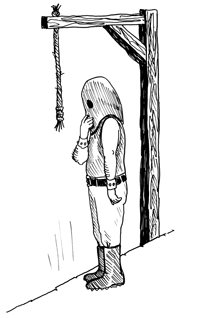STRANGE BUT TRUE- Drop dead: Hanging not a happy way to go

DRAWING BY DEBORAH DERR McCLINTOCK
Q. Over the centuries, prisoners condemned to be hanged by the neck have had plenty to worry about. Have the hangmen/executioners had anything to worry about? –G. Gilmore
A. Old-fashioned "short drop" executions caused death by strangulation as the rope pressed on the windpipe and arteries to the brain, a 10-second demise, says New Scientist magazine. Alas, that was only if the noose was correctly applied. Witnesses of public hangings often reported victims "dancing" in pain at the end of the rope, struggling violently for many minutes as they asphyxiated. In some cases strugglers were cut down and resuscitated, even after 15 minutes!
When public hangings were outlawed in Britain in 1868, the "long-drop" method took over with a lengthy rope to build up greater speed to assure a more "merciful" breaking of the neck. Here the length had to be tailored to the victim's weight, as too great a force "could rip the head clean off, a professionally embarrassing outcome for the hangman."
Yet an analysis as late as 1992 of the remains of 34 prisoners found that only in about half of cases was the cause of death at least partially spinal trauma, with a fifth showing the classic "hangman's fracture." The rest died in part from asphyxiation. But, adds Canadian anthropologist Michael Spence, who studied U.S. victims, the trauma of the drop would have rapidly rendered all of them unconscious anyway. "What the hangmen were looking for was quick cessation of activity, and they knew enough about their craft to ensure that happened. The thing they feared most was decapitation."
Q. Why is the letter 'W' called a double-U instead of a double-V? It sure looks like a double-V. Who mixed up these two letters in the first place? –H. Spencer
A. Norman scribes in the 11th century introduced the "w" to replace the runic symbol "wynn" from Old English, says David Crystal in The Cambridge Encyclopedia of the English Language. It got the name "double-U" because in Middle English "v" and "u" were interchangeable forms, with scribes writing "uu" for the /w/ sound. This old double-identity is still evident in cognate pairs such as flour/flower and suede/Swede (from askoxford.com).
Oddly, the "w" is the only English letter name with more than one syllable, says Wikipedia.org, giving the Web's ubiquitous nine-syllable initialism "www" the irony of being an abbreviation with three times as many syllables as the unabbreviated form World Wide Web.
Q. Don't even think about trying to top this one, but what's the record for skid marks on a public road? –G. Davis
A. Set in 1960 by a Jaguar driver on England's M1 highway, the marks were 290 meters (950 ft) long, says Jearl Walker in The Flying Circus of Physics. In court, the speed at wheellock was alleged to be 160 kilometers per hour (100 mph), though later calculations put it at more like 225 kph (140 mph).
Yet these skid marks pale next to those left by Craig Breedlove in October 1964 at Utah's Bonneville Salt Flats, who drove his rocket-powered "Spirit of America" through a measured mile at about 540 mph. To slow, he released a parachute, but its cord snapped; his second chute also failed. His brakes did little more than leave 6-mile-long skid marks before burning out. Still traveling at 500 mph, the vehicle rode up and over an embankment and plummeted nose down at 160 mph into a pool of brine five meters deep. Firmly strapped into his seat, Breedlove nearly drowned. Yet he had broken the 500-mile-per-hour barrier with an average speed of 526 mph, inadvertently setting the skid-mark record as well.
Q. Are there truly people who never swear? –M. Stuart
A. Dang unlikely! All the world swears; it's just that people swear in highly different ways, says David Crystal in Words, Words, Words. As a natural response to an emotional state, "swearing is not so much a 'use' of language as an outburst, an explosion, which gives relief to a surge of energy." As such it can be a substitute for an aggressive bodily response and thus ironically may help avert a fight.
It's wrong to look for much meaning in swear words, which can be as simple as "gosh" or "golly." If we're politely brought up, we'll moderate our choice of words, perhaps using "Oh, shucks" or "Oh, sugar" instead of "Oh, God" or something stronger.
Of course, swearing fashions change, and what might raise eyebrows for one generation won't for another. For example, the British "bloody"– as in "not bloody likely"– was regarded as "not fit for decent society" 100 years ago, but by the late 20th century Prince Charles himself was using the word publicly. Hence, some TV stations offer commentator guidelines, such as rating a word like "God" as "fine, but be careful of context," or cautioning that words of bigotry are "generally unuseable unless cleared with senior management."
Send Strange questions to brothers Bill and Rich at [email protected].